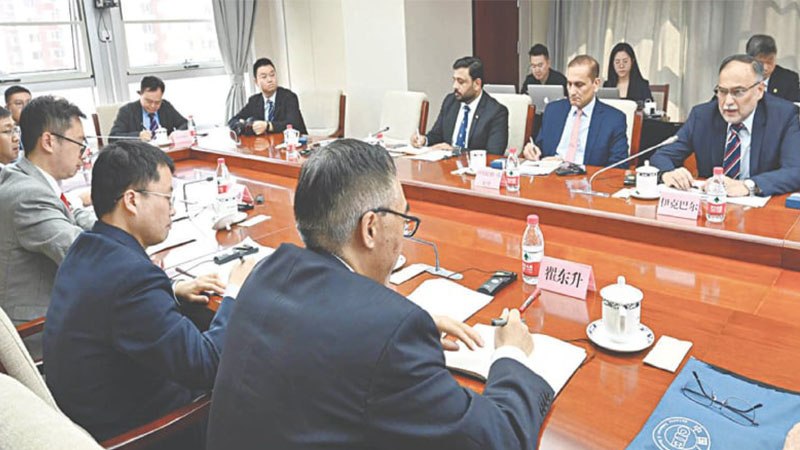In a bid to bolster their economic ties, Pakistan is actively engaging with Chinese leadership to breathe new life into more than 1800-megawatt hydropower projects (HPPs) and entice fresh investments in the nation’s transmission and distribution network. These efforts are integral to the second phase of the China-Pakistan Economic Corridor (CPEC), aimed at fortifying bilateral cooperation and fostering sustainable development.
The Pakistani authorities are leaving no stone unturned in their endeavours, aiming to convene a crucial meeting of the Joint Cooperation Committee (JCC) on May 22-23. This strategic move aims to pave the way for Prime Minister Shehbaz Sharif’s forthcoming visit to Beijing, slated for early next month, to yield significant outcomes.
Currently, a high-level delegation, spearheaded by Planning Minister Ahsan Iqbal, is in China, intensifying efforts to court existing investors and financial institutions while enticing new firms to invest in the transmission and distribution network under CPEC’s ambit.
The focus extends beyond mere investment in transmission projects; Pakistan is keen on luring Chinese firms into the distribution sector, aligning with the government’s push for increased private sector participation. Privatisation and long-term concession agreements are being explored as avenues for this enhanced collaboration.
However, challenges loom over key hydropower projects like Kohala and Azad Pattan, which have faced delays exceeding 18 months due to financing hurdles stemming from substantial payables to existing power producers, amounting to over $1.9 billion.
In a pivotal meeting in Beijing, the Pakistani delegation, including Prime Minister’s Special Assistant Tariq Fatemi and Ambassador to China Khalil Hashmi, engaged with top Chinese companies specialising in power transmission and distribution. These discussions saw the Chinese companies presenting their expertise and practical applications, paving the way for forthcoming collaborations.
A roadmap has been outlined, wherein Chinese experts will interface with Pakistani power sector officials to gather detailed data, enabling informed advisory. Subsequent visits to Pakistan by Chinese companies for in-depth studies and stakeholder engagements are on the agenda, serving as a precursor to high-level talks scheduled for early next month.
Moreover, discussions with Zhang Jianghua, chairman of the National Energy Administration of China, underscored the significance of initiatives like the Green Corridor, a pivotal component of CPEC’s second phase. The Pakistani delegation reiterated its commitment to diversifying the energy mix, emphasising the shift towards clean and renewable energy sources.
Safety and security concerns, particularly regarding Chinese nationals involved in various projects in Pakistan, were also addressed, demonstrating Pakistan’s dedication to ensuring a conducive environment for collaboration.
Looking ahead, both sides are poised to intensify efforts towards energy management enhancement and expeditious implementation of critical hydropower projects like Azad Pattan and Kohala. The stage is set for the next round of discussions under the Joint Working Group meeting on Energy (JEWG), reaffirming the unwavering commitment to robust Pakistan-China cooperation in the energy sector.
